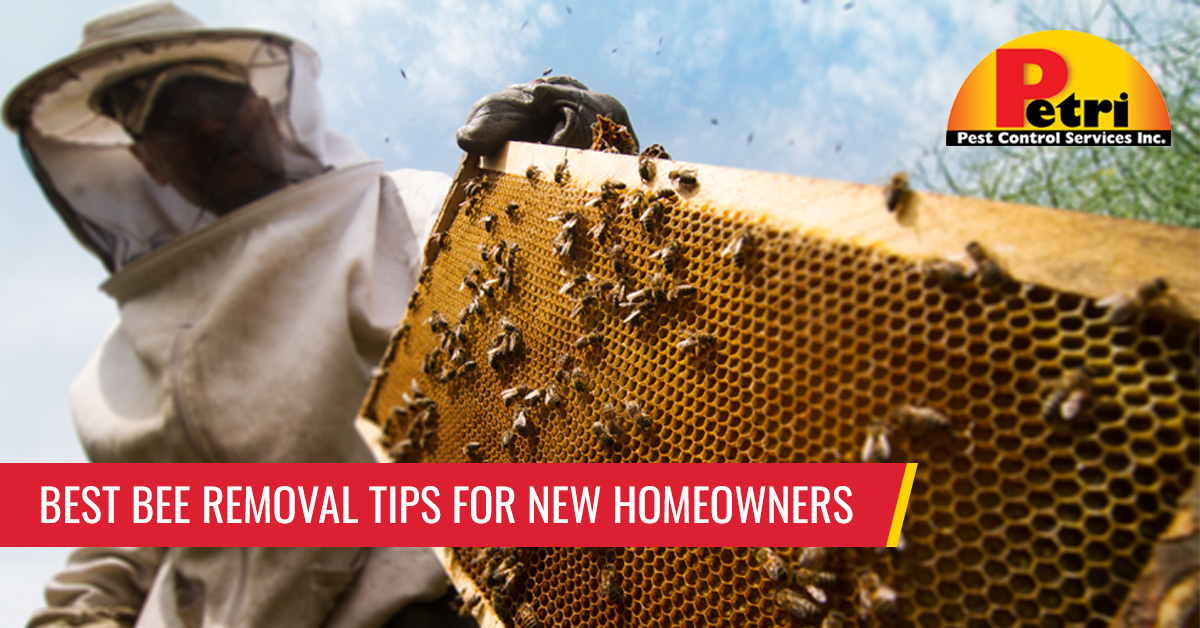
Spring is definitely in the air in South Florida, and so is the Sunshine state’s wide variety of insects, including honey bees. Sometimes, when honey bees swarm, they may enter homes and build hives inside walls, under flooring, or in the eaves of houses. Before you purchase a home, the seller should alert you to any honey bee activity, provided they are aware of any such activity. However, because the seller may not live in the home they’re selling, they may not be aware of any bee activity until after the home is sold.
For new homeowners who maybe didn’t notice bee activity before purchasing their new home, searching “bee removal near me” will give you a list of beekeepers and professional pest control companies that safely remove honey bees. Some professionals may only charge you a fuel charge to remove bees, or more, if bees are located in hard-to-reach places, such as in wall voids. Many beekeepers will gladly relocate honey bees due to their essential role as pollinators.
Honey Bees Essential to Global Food Supply
The importance of honey bees revolves around the fact that honey bees play an essential role in food production globally. According to earthday.org:
- A single bee colony can pollinate 300 million flowers in one day.
- Approximately 75% of the world’s crops depend on pollinators.
- Bees play a massive role in pollinating the plants that we eat.
- In North America, bees help with the production of at least 90 crops.
- Animal species depend on pollination for their food sources, including nuts, berries, seeds, and fruits.
Bee Removal Is Best Left to Professionals
As new homeowners, while it might be tempting to try and remove honey bees yourself, there are many reasons to leave this dangerous task to professionals. Removing bees involves specialized knowledge, protective clothing, headgear, and bee removal equipment. Other things to consider include the following:
- The average honey bee hive contains somewhere in the range of 10,000-60,000 plus members
- Bee removal from structures can prove labor intensive and require a great deal of specialized knowledge and know-how.
- Many honey bees in South Florida have become Africanized, making them more aggressive than European honey bees. While European honey bees are traditionally non-aggressive, most feral bee hives in the US are Africanized due to climate change.
- It is important to keep honey bees alive if relocation is an option. Honey bee populations have declined in recent years due to climate change, increased use of neonicotinoid pesticides, habitat fragmentation, and colony collapse disorder.
DIY Methods to Avoid
Some of the methods to avoid when trying to resolve your honey bee issues include:
- Spraying soapy water on bees
This technique usually has little effect unless you spray the entire hive. Even then, you’ll have dead bees and larvae to deal with, in addition to honey that can overheat or ferment without adult honey bees to tend to it. Seeping out, staining walls and ceilings, and weakening drywall, honey also attracts ants, roaches, and rodents into your home.
- Spraying multiple cans of wasp or bee killer
If honey bees have set up shop inside your walls or under floor boards, where bees are entering your home may kill a few hundred bees but will probably not affect the 60,000 or more bees still in a nest. Again, even if you manage to kill all of the bees, you will still have to deal with dead bees, larvae, and a sticky mess, in addition to the honey-attracting insects and rodents that pose health threats to you and your loved ones.
- Sealing off the entry point
Sealing holes in your wall where you have seen bees entering and exiting your home will do little to eliminate bees. The bees inside will have enough food and air to survive until they find another way to come and go. Another downside of closing off honey bee entryways is that bees may start to come into your living space looking for another way to come and go.
- Smoking bees out
This technique, used by beekeepers when inspecting hives, keeps bees calm by masking the attack pheromones bees release when threatened. Using this technique to get rid of bees may act to drive them further into your home. Additionally, you run the risk of setting your house and/or your landscaping plants on fire, as well as getting stung when the smoke clears.
- Killing the bees, removing the honeycomb, and repairing the access area
A major DIY undertaking that requires a lot of time, labor, and expense, and unless you make sure the access area is properly sealed, pheromones left by the bees will most likely attract other bees to start colonies in the very same spot, repeatedly.
- Ignore the issue and hope it resolves itself
Choosing to ignore the bees and hope they will go away on their own never really ends well. As bee hives mature, their populations grow, and not only are they more difficult to remove, but in the spring, when bees swarm, they will break off and form new colonies in another location in your home or your neighbor’s home. Also, the risk of bees stinging increases. Allergic reactions to bee venom can cause hospitalization in sensitive people.
Not to put too fine a point on it, but honey bees are responsible for pollinating almost every plant food humans and animals consume. New homeowners in South Florida, who suddenly find themselves “searching for bee removal near me” will be pleased to find many beekeepers and professional pest control companies, such as Petri Pest Control Services, that offer bee removal services.
Contact Petri Pest Control for a FREE bee inspection! Once bees are relocated, Petri Pest Control advises that homeowners seal all holes where bees entered structures so as not to attract other bees to the same area in the future. Additionally, we can point you to a professional cleaning service or a contractor that will remove all remaining honey, honeycomb, and any dead bees. Contact a Petri Pest Control Service location near you, serving Broward and Palm Beach Counties for 65 years!
Best Bee Removal Tips For New Homeowners in South Florida
Serving Broward County and Palm Beach County


